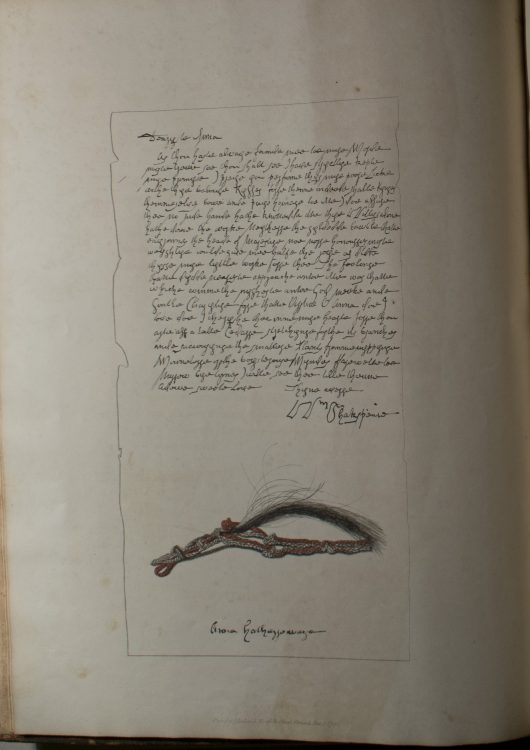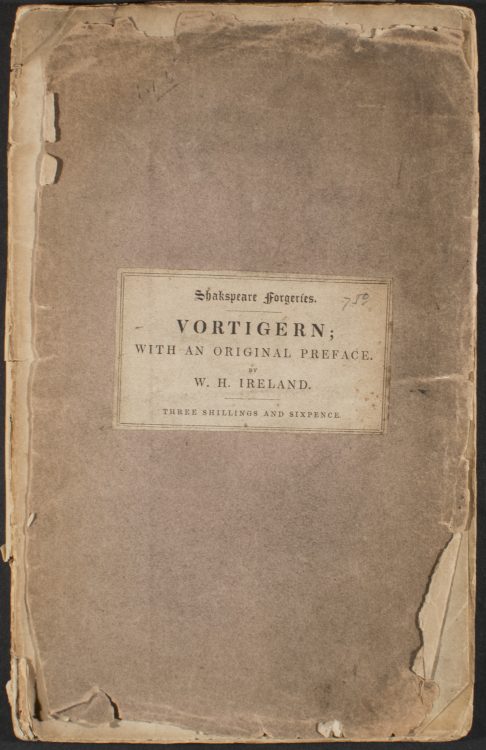William Henry Ireland (1777-1835)
William Henry Ireland’s father, Samuel Ireland (d. 1800), was a passionate Shakespearean, as well an obsessive (and gullible) collector of all things related to Shakespeare. In particular, Samuel Ireland yearned to own a specimen of Shakespeare’s own handwriting. (There are six known surviving examples of his signature, and one possible manuscript fragment.) William once harbored literary aspirations, but he performed poorly in school, and even his parents thought little of him, his intelligence, and his future prospects. William worked as an apprentice in a law office, where he was often left unsupervised, with access to centuries worth of old legal documents. In December 1794, William “found” a legal document that was signed by Shakespeare and presented it to his father. William Henry Ireland had, created the signature by taking an old document and supplying an imitation based on a printed facsimile of a genuine one. Samuel took it to be authentic. Moreover, Samuel, who had always been a distant father, offering William little in the way of warmth or affection, was ecstatic at the find. William explained that he found the document in a trove owned by a “Mr. H.,” who had no interest in the documents himself and said that William was welcome to whatever he wanted. Samuel insisted that William find more – sometimes begging, other times demanding – and William complied, with increasingly exciting “finds.” He “found” a series of letters, including a love letter to Anne Hathaway (1555/6-1623) and a friendly letter from Elizabeth I (1533-1603) to Shakespeare. The “discoveries” got better and better, with William producing annotated books from Shakespeare’s library, the manuscript of King Lear (which showed that all of the bawdy sections were not original to the play, but had been added by actors or later editors), and, finally, Vortigern, a previously undiscovered Shakespeare play. In February 1796, Samuel displayed the documents to the public, and many people who should have known better took them to be authentic. Finally, William produced a document in which Shakespeare willed his writings to an Elizabethan by the name of William Henry Ireland. (Ireland, the document attested, had saved Shakespeare from drowning, and the writings were offered by way of thanks).
[William Henry Ireland (1777-1835)]
Miscellaneous Papers and Legal Instruments Under the Hand and Seal of William Shakespeare: Including the Tragedy of King Lear, and a Small Fragment of Hamlet, from the Original Mss. in the Possession of Samuel Ireland, of Norfolk Street. London: Printed by Cooper and Graham […] Published by Mr. Egerton, Messrs. White, Messrs. Leigh and Sotheby, Mr. Robson and Mr. Faulder, and Mr. Sael, 1796.
Ireland used this volume to publish transcripts and facsimiles of his Shakespeare forgeries. While many had viewed Ireland’s Shakespeare manuscripts on display at his home, few had had a chance to scrutinize them in any serious detail. Now that published copies were readily available, the critical response became increasingly skeptical. In particular, the documents caught the attention of Edmond Malone, an esteemed literary scholar and biographer. He denounced the manuscripts as forgeries, and produced a scathing account that documented the many ways in which the documents were clearly fraudulent. He reproduced additional facsimiles of the forgeries, paired with facsimiles of authentic documents, showing just how drastically different Shakespeare’s handwriting was from the handwriting found in Ireland’s manuscripts. All the more damaging, Malone’s published his findings just two days before the first performance of Vortigern, the “new” Shakespeare play that Ireland had “discovered.” Vortigern debuted and flopped before a packed crowd on April 2, 1796.
Initially, Samuel was blamed for the forgeries, since he had been the one to promote them. Hoping to restore his father’s reputation, William published a pamphlet describing how he had created the Shakespeare forgeries, making it clear that he was taking full responsibility and that his father could be faulted only for his credulity. William expressed remorse, stating that he hoped the public would “deem the whole the act of a boy, without any evil or bad intention, but hurried on thoughtless of any danger that waited to ensnare him.” Samuel insisted that his son was too stupid to have forged the Shakespeare manuscripts and concluded that William was lying to draw attention to himself. Their relations grew all the more rancorous, and Samuel went to his grave believing that his Shakespeare manuscripts were real.
William Henry Ireland (1777-1835)
Vortigern; an Historical Play. London: Joseph Thomas, 1832
Years after the fact, Vortigern was published in this volume, with the play explicitly marketed as a forgery. By this point, any regrets that William felt had faded: he expressed pride in his accomplishment, particularly for having fooled so many when he was only a youth.



